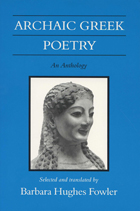
In addition to its breadth, Archaic Greek Poetry stands alone as the only volume of its kind translated by a contemporary published poet. Perhaps the most elegant translator of ancient Greek poetry into modern English, Barbara Hughes Fowler offers translations true to the original Greek while providing modern readers with superb examples of the beauty of lyric poetry. Students and scholars of classical and comparative literature, ancient history, and art history, as well as lovers of lyric poetry, will enthusiastically welcome this volume.
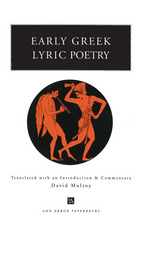
In Early Greek Lyric Poetry David Mulroy offers an accurate and lively translation of all the important lyric fragments and new papyri, as well as selections from the more fully preserved works of Theognis, Bacchylides, and Pindar. Unlike any other version of these poems, Early Greek Lyric Poetry also provides a translation of the literary context in which each poem survives. This format enables readers to see for themselves why particular lines or phrases happen to be preserved, and it also provides information on how earlier writers understood the poems.
The poems and fragments are accompanied by a comprehensive introduction to the genre and to the individual poets, explanatory notes, and a useful bibliography. Early Greek Lyric Poetry is indispensable for courses on Greek culture and literature in translation or on literary "great books."
David Mulroy is Associate Professor of Classics, University of Wisconsin at Milwaukee. He is also the author of Horace's Odes and Epodes: Translated with an Introduction and Commentary.

Ancient metricians saw Greek verse in essentially paradigmatic terms, as a mosaic of discrete feet or phrases, each with its own name and each conforming, within a permitted range of variation, to some fixed model. The syntagmatic alternative to this view offered here represents the first attempt since the early nineteenth century to make a decisive break with inherited metrical categories and assumptions. It argues that feet and phrases, to the extent that they exist at all in Greek lyric verse, tend to be present at the level of parole rather than langue—constituting one of a number of possible ways of articulating some larger rhythmical continuum. These larger rhythmical structures, comparable to the movements of a piece of Classical Western music but allowing for a more fluid bar structure, a greater variety of basic time signatures, and more frequent modulation, are the minimal independent utterances in lyric discourse.
Recognition of their existence and character allows a reduction of the bewildering multiplicity of rhythmical nomenclature to something much more simple and manageable, as well as a clearer view both of the architectonics of the Greek stanza and of the main lines of its development during the three centuries (700–400 B.C.) when rhythmical innovation and experimentation were at their height. The organization of the book is partially by genres, partially historical; its use in the study of individual passages is facilitated by a full index locorum.

Equine Poetics is a literary analysis of horses and horsemanship in early Greek epic and lyric poetry, especially those facets that reflect the prehistory of Greek language and culture.
The book begins with Ryan Platte’s analysis of Homeric formulas for horses, proposing a model by which most such formulas may be understood as members of a single verbal network, with roots in preliterate antiquity. He then considers the poetic relationship between horses and humans, leading to an analysis of the figure of the metapoetic charioteer. Finally, the work compares myths featuring chariot races and bridal contests, focusing on the supposed mythological inventiveness of Pindar’s Olympian 1.
Platte develops a methodology rooted in oral verse mechanics to understand contest-based mythical parallels that have defied easy historical explanations—in Greece and beyond. Drawing from the fields of comparative poetics and historical linguistics, Equine Poetics sheds new light on fascinating and puzzling aspects of these central figures in early Greek verbal art.

A gathering of poetic blossoms.
The Greek Anthology contains some 4,500 short Greek poems in the sparkling and diverse genre of epigram, written by more than a hundred poets and collected over many centuries. To the original collection, called the Garland (Stephanus) by its contributing editor, Meleager of Gadara (first century BC), was added another Garland, by Philip of Thessalonica (mid-first century AD) and then a Cycle by Agathias of Myrina (AD 567/8). In about AD 900 these collections (now lost) and perhaps others (also lost, by Rufinus, Diogenianus, Strato, and Palladas) were partly incorporated and arranged into fifteen books according to subject by Constantine Cephalas; most of his collection is preserved in a manuscript called the Palatine Anthology. A second manuscript, the Planudean Anthology made by Maximus Planudes in 1301, contains additional epigrams omitted by Cephalas.
Outstanding among the poets are Meleager, Antipater of Sidon, Crinagoras, Palladas, Agathias, and Paulus Silentiarius.
This Loeb edition of The Greek Anthology replaces the earlier edition by W. R. Paton, with a Greek text and ample notes reflecting current scholarship. Volume I contains the following: Book 1. Christian Epigrams; Book 2. Description of the Statues in the Gymnasium of Zeuxippus; Book 3. Epigrams in the Temple of Apollonis at Cyzicus; Book 4. Prefaces to Various Anthologies; Book 5. Erotic Epigrams.

Precious snippets of ancient song.
This volume contains the poetic fragments of the two illustrious singers of early sixth-century Lesbos: Sappho, the most famous woman poet of antiquity, whose main theme was love; and Alcaeus, poet of wine, war, and politics, and composer of short hymns to the gods. Also included are the principal testimonia, the ancients’ reports on the lives and work of the two poets.
The five volumes in the Loeb Classical Library edition of Greek Lyric contain the surviving fragments of solo and choral song. This poetry was not preserved in medieval manuscripts, and few complete poems remain. Later writers quoted from the poets, but only so much as suited their needs; these quotations are supplemented by papyrus texts found in Egypt, most of them badly damaged. The high quality of what remains makes us realize the enormity of our loss.
Volume I presents Sappho and Alcaeus. Volume II contains the work of Anacreon, composer of solo song; the Anacreontea; and the earliest writers of choral poetry, notably the seventh-century Spartans Alcman and Terpander. Stesichorus, Ibycus, Simonides, and other sixth-century poets are in Volume III. Bacchylides and other fifth-century poets are in Volume IV along with Corinna (although some argue that she belongs to the third century). Volume V contains the new school of poets active from the mid-fifth to the mid-fourth century and also collects folk songs, drinking songs, hymns, and other anonymous pieces.
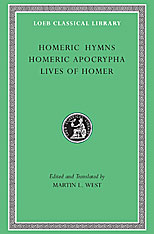
Invocations, curiosities, and biographies connected with the famous Greek bard.
Performances of Greek epics customarily began with a hymn to a god or goddess—as Hesiod's Theogony and Works and Days do. A collection of thirty-three such poems has come down to us from antiquity under the title “Hymns of Homer.” This Loeb Classical Library volume contains, in addition to the Hymns, fragments of five comic poems that were connected with Homer’s name in or just after the Classical period (but are not today believed to be by the author of the Iliad and the Odyssey). Here too is a collection of ancient accounts of the poet’s life.
The Hymns range widely in length: two are over 500 lines long; several run only a half dozen lines. Among the longest are the hymn to Demeter, which tells the foundational story of the Eleusinian Mysteries; and to Hermes, distinctive in being amusing. The comic poems gathered as Homeric Apocrypha include Margites, the Battle of Frogs and Mice, and, for the first time in English, a fragment of a perhaps earlier poem of the same type called Battle of the Weasel and the Mice. The edition of Lives of Homer contains The Contest of Homer and Hesiod and nine other biographical accounts, translated into English for the first time.
Martin West’s faithful and pleasing translations are fully annotated; his freshly edited texts offer new solutions to a number of textual puzzles.
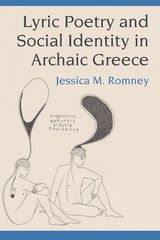
All non-English text and quotes are translated, with the original languages given alongside the translation or in the endnotes.

The interest in the performance of ancient Greek poetry has grown dramatically in recent years. But the competitive dimension of Greek poetic performances, while usually assumed, has rarely been directly addressed. This study provides for the first time an in-depth examination of a central mode of Greek poetic competition—capping, which occurs when speakers or singers respond to one another in small numbers of verses, single verses, or between verse units themselves. With a wealth of descriptive and technical detail, Collins surveys the wide range of genres that incorporated capping, including tragic and comic stichomythia, lament, forms of Platonic dialectic and dialogue, the sympotic performance of elegy, skolia, and related verse games, Hellenistic bucolic, as well as the rhapsodic performance of epic. Further, he examines historical evidence for actual performances as well as literary representations of live performances to explore how the features of improvisation, riddling, and punning through verse were developed and refined in different competitive contexts.
Anyone concerned with the performance of archaic and classical Greek poetry, or with the agonistic social, cultural, and poetic gamesmanship that prompted one performer to achieve "mastery" over another, will find this authoritative volume indispensable.
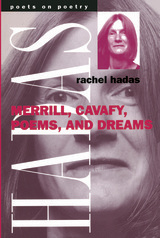
The second half of the book combines explorations of various corners and horizons of the poetry scene, including neglected American poets and Hadas's thoughts on her own poetics and career. "Two Letters from New York" and "Tangled Web Sites" take bemused looks at literary or cultural landscapes. Hadas also looks inward: to dreams and dreamwork, to her dead mother's address book, to the emblematic drilling of a well in a country house. The range of selections includes essays, interviews, memoir, criticism, and a few of Hadas's own poems.
Rachel Hadas is the author of eleven books of poetry, essays, and translations. Her most recent book is Halfway Down the Hall: New and Selected Poems. She has received a Guggenheim Fellowship in Poetry and an American Academy-Institute of Arts and Letters Award in Literature, and is a member of the American Academy of Arts and Sciences. She is Professor of English at the Newark campus of Rutgers University.

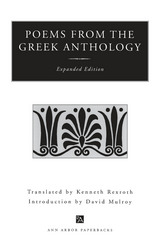
Friend to the Beats, organizer of the Six Gallery poetry reading in 1955, and iconoclastic poet extraordinare, Kenneth Rexroth here turns his imagination to a selection of verses from the Greek Anthology. In his lively style he successfully captures the spirit of the originals by such poets as Sappho, Anyte, Glykon, Antipatros, Leonidas, Askelpiades, and Ammianos. Students of the classics as well as poets and translators will welcome this collection for the insight and dexterity of its unconventional editor.
Kenneth Rexroth (1905-1982), poet, critic, and translator, is also noted for his translations from the Chinese and Japanese. Widely prolific, he helped usher in the Beat movement in the 1950s and is widely considered to have invented the idea of San Francisco as a center of literary innovation. David Mulroy is Associate Professor in the Department of Foreign Languages and Linguistics, University of Wisconsin, Milwaukee. He is the translator of Early Greek Lyric Poetry and Horace's Odes and Epodes.


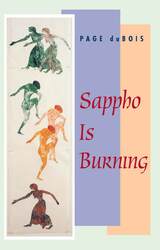
In Sappho is Burning, duBois reads Sappho as a disruptive figure at the very origin of our story of Western civilization. Sappho is beyond contemporary categories, inhabiting a space outside of reductively linear accounts of our common history. She is a woman, but also an aristocrat, a Greek, but one turned toward Asia, a poet who writes as a philosopher before philosophy, a writer who speaks of sexuality that can be identified neither with Michel Foucault's account of Greek sexuality, nor with many versions of contemporary lesbian sexuality. She is named as the tenth muse, yet the nine books of her poetry survive only in fragments. She disorients, troubles, undoes many certitudes in the history of poetry, the history of philosophy, the history of sexuality. DuBois argues that we need to read Sappho again.

Tales of Dionysus is the first English verse translation of one of the most extraordinary poems of the Greek literary tradition, the Dionysiaca of Nonnus of Panopolis. By any standard, the Dionysiaca is a formidable work. It is by far the longest poem surviving from the classical world, a massive mythological epic stretching to over 20,000 lines, written in the tradition of Homer, using Homer’s verse, Homer’s language, his narrative turns and motifs, and invoking his ancient Muses. But it is also the last ancient epic to follow a Homeric model, composed so late in fact that it stands as close in time to the Renaissance as it does to archaic Greece. Like its titular hero, Dionysus, with his fluidity of forms, names, and divine incarnations, the poem itself is continually shifting shape. Out of its formal epic frame spills a tumult of ancient literary types: tragedy, elegy, didactic, panegyric, pastoral idyll, and the novel are all parts of this gigantic enterprise, each genre coming to the fore one after the other.
Tales of Dionysus brings together forty-two translators from a wide range of backgrounds, with different experiences and different potential relationships to the text of Nonnus’ poem. All work in their own styles and with their own individual approaches to the poem, to translation, and to poetic form. This variety turns Tales of Dionysus into a showcase of the multiple possibilities open to classical translation in the contemporary world.

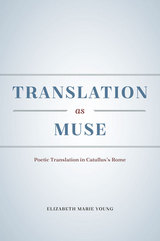
Catullus has long been admired as a poet, but his efforts as a translator have been largely ignored. Young reveals how essential translation is to his work: many poems by Catullus that we tend to label as lyric originals were in fact shaped by Roman translation practices entirely different from our own. By rereading Catullus through the lens of translation, Young exposes new layers of ingenuity in Latin poetry even as she illuminates the idiosyncrasies of Roman translation practice, reconfigures our understanding of translation history, and questions basic assumptions about lyric poetry itself.
READERS
Browse our collection.
PUBLISHERS
See BiblioVault's publisher services.
STUDENT SERVICES
Files for college accessibility offices.
UChicago Accessibility Resources
home | accessibility | search | about | contact us
BiblioVault ® 2001 - 2024
The University of Chicago Press









